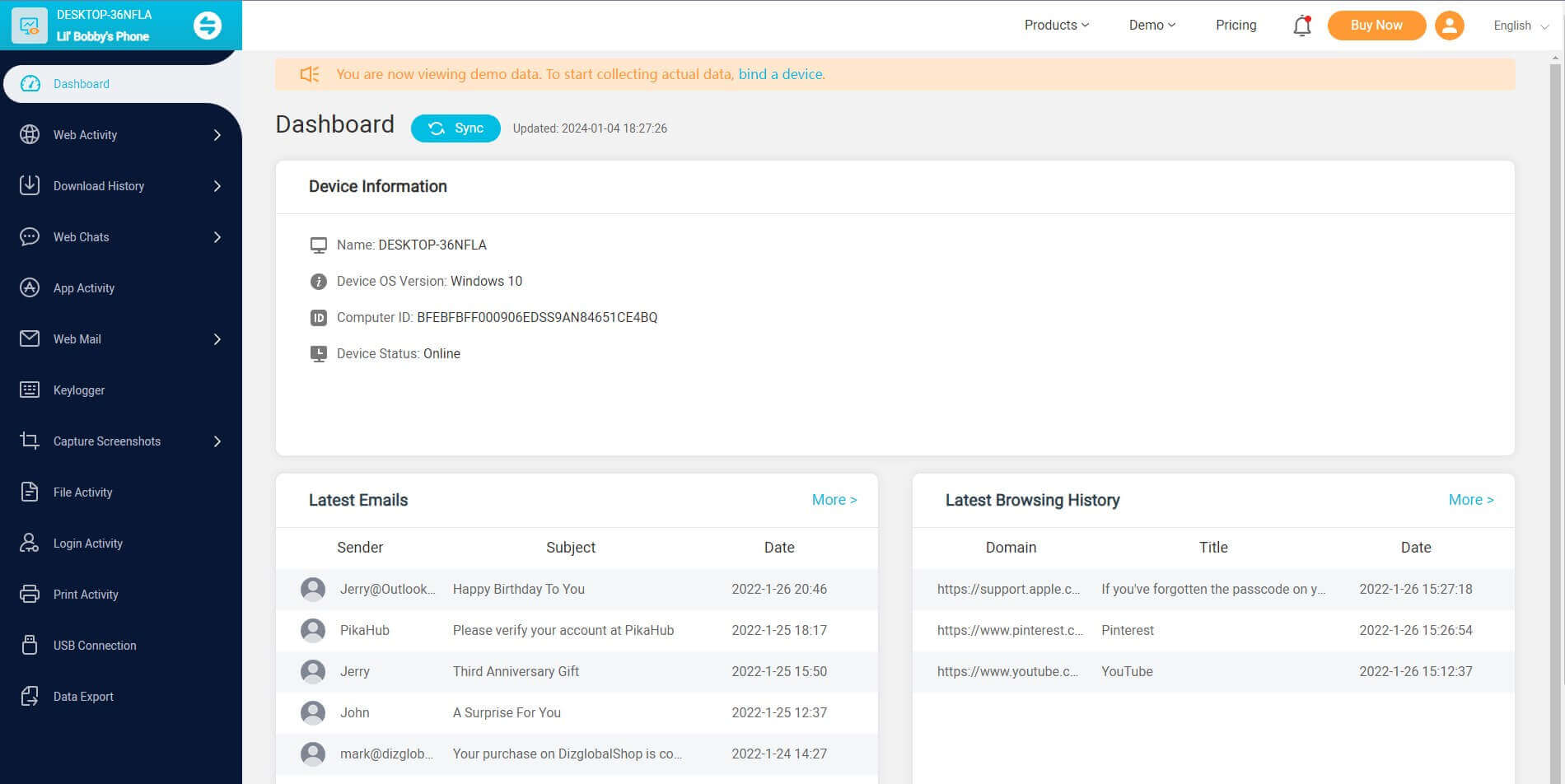ClevGuard Support: Monitor Devices with Others' Permission.
Getting the hang of time management is a big deal – it can seriously shape how we navigate both our personal and professional lives. But, let's keep it real, a bunch of us find ourselves in a bit of a time-management struggle. That often translates to deadlines slipping away, stress levels shooting up, and just an overall feeling of being totally overwhelmed.
In this read, we'll dig into the signs of poor time management, its impact on different facets of our lives, and dish out some down-to-earth tips to amp up the time management skills.
What Makes Email Spy Necessary?
Identifying signs of poor time management is the first step toward positive change. Here are some common indicators that someone may be struggling:
Missed deadlines: Constantly missing deadlines can lead to frustration and damage professional relationships.
Feeling overwhelmed: Constantly feeling overwhelmed can result in procrastination and decreased productivity.
Lack of focus: Difficulty focusing on tasks can lead to decreased performance and a lack of progress in achieving goals.
Constant multitasking: Juggling multiple tasks simultaneously often leads to decreased efficiency and lower quality work.
Procrastination: Putting off tasks until the last minute can result in increased stress and rushed work.
Ineffective prioritization: Struggling to prioritize tasks can lead to wasted time on less critical tasks.
Poor planning and scheduling: Failing to plan ahead can result in a chaotic work schedule and missed deadlines.
Constantly working overtime: Working late may suggest an inability to set boundaries between work and personal life.
Skipping breaks: Neglecting breaks can lead to decreased productivity and increased stress.
Low energy and burnout: Poor time management often results in low energy levels and burnout.

Effects of Bad Time Management
Poor time management can have significant negative effects on various aspects of life. Here are some of the consequences that can arise from failing to manage time effectively:
Decreased productivity: Poor time management often leads to decreased productivity. It can result in wasted time, missed deadlines, and a lack of progress in achieving goals.
Increased stress levels: Failing to manage time effectively can lead to increased stress levels. Constantly feeling overwhelmed and rushing to meet deadlines can contribute to anxiety and a sense of being constantly behind.
Strained relationships: Poor time management can put strain on personal and professional relationships. Constantly missing appointments, being late, or failing to meet commitments can damage trust and credibility.
Health issues: Chronic stress resulting from poor time management can lead to various health issues, including sleep disturbances, weakened immune system, and mental health problems such as anxiety and depression.
Strained relationships: Poor time management can put strain on personal and professional relationships. Constantly missing appointments, being late, or failing to meet commitments can damage trust and credibility.
Decreased work-life balance: Bad time management can disrupt work-life balance. It can lead to excessive work hours, neglecting personal and leisure activities, and an overall feeling of being overwhelmed and unfulfilled.
Missed opportunities: Failing to manage time effectively can result in missed opportunities for personal and professional growth. It can hinder career advancement, limit productivity, and prevent the achievement of long-term goals.
Lower quality of work: Bad time management often leads to rushed and lower quality work. It can result in mistakes, errors, and a decrease in overall work performance.
Time Management Mistakes & Difficulties
Understanding the reasons behind poor time management is essential for making improvements. Here are some common mistakes and difficulties that contribute to ineffective time management:
Procrastination: How does procrastination affect your time management? It involves delaying tasks and prioritizing less important activities over more critical ones.
Lack of prioritization: Failing to prioritize tasks can lead to a lack of focus and productivity. Without clear priorities, it becomes challenging to allocate time effectively and complete important tasks on time.
Ineffective planning: Poor planning can result in wasted time and missed deadlines. It is essential to create a realistic plan, set achievable goals, and allocate sufficient time for each task.
Underestimating time: Underestimating the time needed to complete tasks is a common time management difficulty. It leads to rushed work, missed deadlines, and increased stress levels.
Lack of focus and distractions: Difficulty maintaining focus and succumbing to distractions can hinder effective time management. It is important to eliminate or minimize distractions and create a conducive work environment.
Overcommitting and overworking: Overcommitting to tasks and taking on more than one can handle leads to poor time management. It is essential to set realistic expectations and delegate when necessary.
Failure to adapt and prioritize: Inability to adapt to changing circumstances and prioritize tasks accordingly can result in inefficient time management. It is crucial to reassess priorities regularly and adjust plans as needed.
Tips for Improving Time Management
Now that we have identified the signs and effects of poor time management, let's explore some practical tips for how to improve time management skills:
- Set clear goals and priorities: Clearly define your goals and prioritize tasks based on their importance. This will help you stay focused and allocate time effectively.
- Create a schedule and to-do list: Use a calendar or planner to create a schedule and a to-do list. Break down tasks into smaller, manageable steps and allocate specific time slots for each task.
- Set clear goals and priorities: Clearly define your goals and prioritize tasks based on their importance. This will help you stay focused and allocate time effectively.
- Eliminate or minimize distractions: Identify common distractions and take steps to eliminate or minimize them. Turn off notifications on your phone, block distracting websites, and create a dedicated workspace.
- Practice effective prioritization: Prioritize tasks based on their importance and urgency. Use techniques like the Eisenhower Matrix to categorize tasks and focus on high-priority activities.
- Delegate and collaborate: Learn to delegate tasks when appropriate and collaborate with others to share the workload. This will help free up time for more critical tasks and improve overall productivity.
- Practice time blocking: Time blocking involves scheduling specific time blocks for different tasks or activities. This helps create a structured and focused approach to managing your time.
- Take regular breaks: Schedule regular breaks to recharge and maintain productivity. Use this time to relax, stretch, or engage in activities that help clear your mind.
- Set realistic expectations: Be realistic about what you can accomplish in a given time frame. Avoid overcommitting and learn to say no when necessary.
- Review and reflect: Regularly review your progress and reflect on your time management practices. Identify areas for improvement and make necessary adjustments to your schedule and habits.
- Use time-tracking tools: Consider using time-tracking tools or apps to monitor how you spend your time. This will help you identify time-wasting activities and adjust your habits accordingly.
By implementing these tips and adopting effective time management strategies, you can improve productivity, reduce stress, and achieve a better work-life balance.
MoniVisor: A comprehensive PC monitoring tool
If you're looking to scale your time management skills up to a new level, then don’t miss out on MoniVisor, a top-notch PC monitoring tool crafted to help you handle your time like a pro. MoniVisor lets you keep tabs on your computer usage, track productivity, and break down the time you spend on various tasks and apps.

Boasting a user-friendly interface and some seriously powerful features, MoniVisor gives you the lowdown on your computer habits. It's a game-changer for identifying areas where you can level up and fine-tune your time management strategy. Give it a shot and watch your productivity soar!
Final Thoughts
When we see we're not handling time well, get how it messes things up, and start using some down-to-earth tips, we get better at managing time and hitting our goals faster. Just know, getting good at this time stuff is an everyday thing. You've got to know yourself, stay on track, and be ready to switch things up. Stick with it, practice a bit, and anyone can get the hang of managing time like a boss, doing more without all the stress.
If you need a time tracker software for Windows PC, MoniVisor is worth a try to monitor software usage spent on each task.






